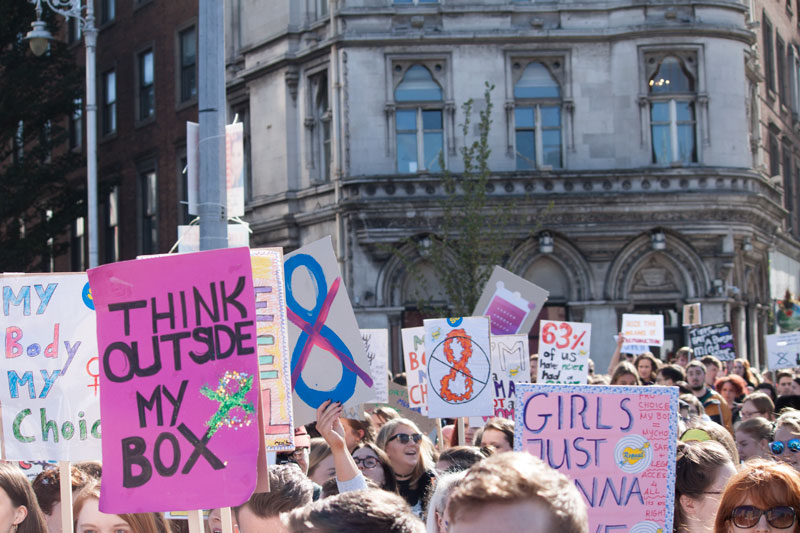On Saturday, September 30th, I found myself marching among the repeal jumper-clad masses, armed with posters evincing pro-choice sentiments and creative depictions of ovaries. I chanted in accord with pro-choice rallying cries and donned my own aptly labeled “femme” cap. I even grew a touch emotional listening to the speeches of the Irish students’ union presidents.
I should mention that the Irish constitution’s eighth amendment, which prohibits women from receiving an abortion should they be faced with an unwanted pregnancy, has not held any significance in my life until just recently. As an international student from the US, where controversy surrounding the topic of abortion is stunningly vehement, I’ve been exposed to heated opinions on both sides.
The difference here is the legality of the issue. The US legalised abortion in the 1973 court case Roe vs Wade, both protecting women’s health in obtaining safe abortions and allowing women to choose to do so for themselves. Obviously the legalisation didn’t put an end to the debate, as a great deal of Americans are still adamantly pro-life and looking to overturn the decision. As of late, the US seems to be taking giant steps backwards, thanks in part to a radically misogynistic president who has made the divisive issue especially pressing. In 2015, a man expressing anti-abortion views shot and killed multiple people at a Planned Parenthood clinic in Colorado. The irony is clear: in a fanatical attempt to “save” the lives of unborn infants, this man annihilated the lives of women.
In the US, being pro-life typically represents a conservative, traditional, right-wing stance. Being pro-choice represents more liberal values. As such, I’ve always seen the pro-life movement as regressive and contrary to advancements in social policy and women’s rights.
However, despite the fact that the issue is still hotly contested between liberals and conservatives in the US, abortion is legal. It has been for all of my life. I, along with women across America, can utilise a non-profit resource like Planned Parenthood for reproductive health care and receive whatever help I might need. Learning of the eighth amendment in Ireland made me realize that perhaps I’ve taken such a privilege for granted. If my Irish friends were ever in need of a service like Planned Parenthood, they would be denied, forced to either hide the problem or travel secretly to the UK for treatment.
Learning of the eighth amendment in Ireland made me realize that perhaps I’ve taken such a privilege for granted.
That Ireland remains a place where women are legally not permitted to make such a personal choice still seems mind-boggling to me, especially considering the nation’s recent history of liberal social progress. I wondered to myself momentarily whether or not the issue of abortion in Ireland applied to me, and if I should even march at all. It took little time to confirm what my gut knew: this is not a fight for Irish women alone.
That Ireland remains a place where women are legally not permitted to make such a personal choice still seems mind-boggling to me, especially considering the nation’s recent history of liberal social progress.
Up until this point, as an American woman, I have been very aware of my right to make critical choices about my own body should I ever need to do so. But now, living in Ireland, my options, and those of all the women around me, are no longer so clean-cut. For me, this shift throws into sharp relief the necessity of repealing the eighth, the immediacy of the issue, the vast significance of it. It is not divided by nation or province or ethnicity. It is not simply a women’s issue either, as evidenced by the number of men who showed their support at the march on Saturday, as well as by the number of men who vocalise, often violently, their opposition to a woman’s right to choose.
The issue clearly concerns all of us, both in Ireland and abroad. So for international students, men and women alike, our support for the pro-choice movement to repeal the eighth is as necessary and essential as that of any Irish student.







